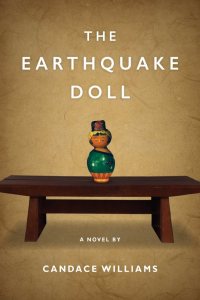 The Earthquake Doll
The Earthquake Doll
by Candace Williams
Genre: Historical Fiction
300 pages
4.7 stars on 25 reviews
Miyoko Takahashi struggles between the dictates of an ancient family covenant and the desire of her secret heart during Japan’s greatest cultural upheaval. Imperial Japan is
gone and the new democracy threatens to overturn the age-old belief that duty to family is more important than personal emotion.
When tragedy strikes, Miyoko is ordered to fulfill her family’s duty under the covenant. If she disobeys, she will dishonor the memory of her father, bring hardship upon the family, and deny her secret heart’s desire for happiness.
As the sun rises over the new Japan, Miyoko searches for an honorable way to balance tradition and freedom.
Available at Amazon.com and Amazon UK.
Exclusive excerpt from The Earthquake Doll by Candace Williams
Koji had returned from school and was in the courtyard removing his shoes when Miyoko came home. He put his finger to his lips and motioned for her to come closer.
“What?” she whispered.
He slipped her a folded piece of rice paper.
“What is it?”
“It is a note for you, from Tadashi-san.”
She felt heat rise immediately to her neck and face. Her heart pounded softly in her eardrums.
She caught Koji’s grin just as he was closing the door behind him. She tucked the note inside her sleeve pocket and removed her shoes. She rushed inside so she could go up to her room and read the note.
The door to the garden was open as she passed. Uncle Yoshi called to her. “Miyoko-chan, come and tell me about your day at the American house.”
Miyoko stopped, one foot on the stair. Uncle Yoshi was always interested to hear about American culture, but all she could think about now was the note.
“First let me just go upstairs a moment, Uncle, and –”
Koji stuck his head around the garden door. “Yes, Cousin. I would like to hear all about your day, as well. Every single thing. In detail.” He grinned wickedly. “You can go up to your room later. Come.” He politely held the shoji open for her.
“You are a devil,” she whispered as she passed him.
Uncle Yoshi fanned himself while sitting on the same stone bench from which she first saw Tadashi. He wore the brown and gray kimono he usually put on when he came home from work. “Come and sit,” he said.
She sat on one of the stones that surrounded the pond. Koji joined his father on the bench and looked down upon her with elaborate regality. She would think of a way to torment him later.
For several excruciatingly slow minutes, she politely answered questions while the note from Tadashi burned against her arm.
Uncle Yoshi was concerned about the disharmony in the American household. He passed a handkerchief over his balding head and frowned. “I suspect this is common with their love marriages.”
He smiled at her. “I believe our way is better. You see? If my wife had not arranged the miai for you and Nakamura Tadashi, we would not have discovered a disharmony between the families until it was too late.”
“My father is so wise, Miyoko-chan,” Koji said. “Think how sad it would have been if you and my classmate had met and decided to marry for love before a proper miai.”
Miyoko lowered her head demurely. “This is why I have such gratitude to your mother for being nakodo.” She glanced up and looked into Koji’s eyes. “And remember, Cousin, my mother will act as nakodo for you after my husband is found. I will do my best to assist her.”
Koji’s smile froze on his face.
She rose and bowed. “I must help prepare dinner.”
It was maddening to have to wait before she could go upstairs to see what the note said. Dinner was eaten so slowly she thought the food itself had surely grown faster than they consumed it. Then the dishes had to be washed, dried, and put away. Even when she went upstairs there was a delay, for she had not yet moved her things from the children’s room. Now that she was a lady of the household, she was to share a room with Mother until a marriage was arranged. As soon as she entered the room, Namiko and little Jiro wanted her to tell them about the American girl’s birthday party.
“There is only one birthday celebration for American children,” Miyoko explained. “No Girls’ Day Festival, nor even a Children’s Day.”
“Poor Tina-chan,” Jiro said.
“Did she like the earthquake doll?” Namiko asked.
“Yes, very much.”
The children wanted to know all about the food that had been served and the games played by the American children. Miyoko slipped her right hand inside the opposite sleeve of her kimono and fidgeted with the note. Would it be the middle of the night before she could read it?
At last the children left to play in the garden and she had her first moment alone. It was almost sundown. She knelt by the window for better light. The paper was expertly folded. The language was formal. The calligraphy was so exact and finely spaced that she knew this note must be the product of several practice pieces.

Thank you for showcasing my novel!
This is an excellent story. I enjoyed it and learned a lot about Japanese culture of honor. I am glad BigAl pointed me towards this story and asked if I would be willing to do a doubleshot review with him at Books and Pals. I appreciate the fact that he likes to push me out of my genre preferences once and a while. I highly recommend Earthquake Doll.
Thanks! I remember being bowled over by your review. 🙂